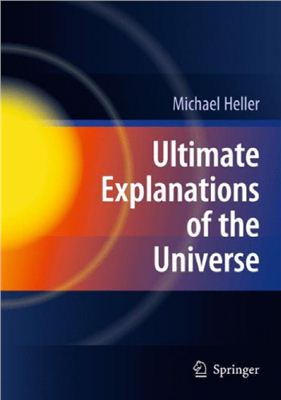Springer, 2009, 216 pages
We humans are collectively driven by a powerful - yet not fully explained - instinct to understand. We would like to see everything established, proven, laid bare. The more important an issue, the more we desire to see it clarified, stripped of all secrets, all shades of gray. What could be more important than to understand the Universe and ourselves as a part of it? To find a window onto our origin and our destiny? This book examines how far our mode cosmological theories - with their sometimes audacious models, such as inflation, cyclic histories, quantum creation, parallel universes - can take us towards answering these questions. Can such theories lead us to ultimate truths, leaving nothing unexplained? Last, but not least, Heller addresses the thoy problem of why and whether we should expect to find theories with all-encompassing explicative power.
Ultimate explanations
Problems with the eteity of the universe
A cyclical universe
A looped cosmos
Continuous creation versus a beginning
Something almost out of nothing
The quantum creation of the universe
Anthropic principles and other universes
The anthropic principles
Natural selection in the population of universes
The anthropic principles and theories of everything
The metaphysics of the anthropic principles
Tegmark’s embarrassment
Creation of the universe
The drive to understand
The metaphysics and theology of creation
Creation and the perpetuity of the universe
Controversies over the omnipotence of god
Newton’s world
Leibniz’s world
The initial singularity and the creation of the world
Creation and evolution
Leibniz’s question
We humans are collectively driven by a powerful - yet not fully explained - instinct to understand. We would like to see everything established, proven, laid bare. The more important an issue, the more we desire to see it clarified, stripped of all secrets, all shades of gray. What could be more important than to understand the Universe and ourselves as a part of it? To find a window onto our origin and our destiny? This book examines how far our mode cosmological theories - with their sometimes audacious models, such as inflation, cyclic histories, quantum creation, parallel universes - can take us towards answering these questions. Can such theories lead us to ultimate truths, leaving nothing unexplained? Last, but not least, Heller addresses the thoy problem of why and whether we should expect to find theories with all-encompassing explicative power.
Ultimate explanations
Problems with the eteity of the universe
A cyclical universe
A looped cosmos
Continuous creation versus a beginning
Something almost out of nothing
The quantum creation of the universe
Anthropic principles and other universes
The anthropic principles
Natural selection in the population of universes
The anthropic principles and theories of everything
The metaphysics of the anthropic principles
Tegmark’s embarrassment
Creation of the universe
The drive to understand
The metaphysics and theology of creation
Creation and the perpetuity of the universe
Controversies over the omnipotence of god
Newton’s world
Leibniz’s world
The initial singularity and the creation of the world
Creation and evolution
Leibniz’s question

